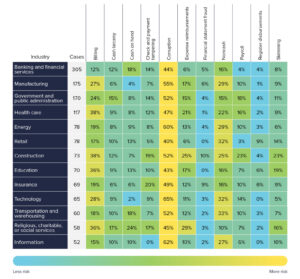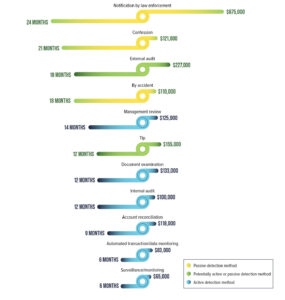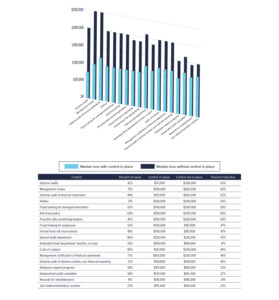By Jon Klerowski, CPA, CFE, ABV; Brian McDonough, CPA, CFE; and Rebecca Nardi, CPA, CFE
The Association of Certified Fraud Examiners (ACFE) recently released their Report to the Nations. Based on the results of the report, it is estimated the average organization loses five percent of their revenue to fraud each year. To repeat: that is FIVE PERCENT of top-line revenue!
As part of PKF O’Connor Davies’ role in helping organizations prevent, deter and detect fraud, our forensic accounting specialists weigh in on the highlights of the ACFE’s 2024 Report to the Nations (2024 RTN).
Overview
The report contains the results of a comprehensive study of the costs, methods, victims and perpetrators of occupational fraud. The study, encompassing 1,921 cases across 138 countries, gathered data regarding occupational fraud cases that companies investigated around the world from January 2022 through September 2023.
Corruption: Most Common Scheme
There are three main categories of occupational fraud:
- Asset misappropriation
- Corruption
- Financial statement fraud
Each consists of numerous types of schemes. Unfortunately, all organizations can be victims of fraud, no matter the size, type (i.e. private, public, nonprofit or government entities), industry or region.
What Are the Most Common Occupational Fraud Schemes in Various Industries?

Cryptocurrency Schemes
New to the 2024 RTN, the ACFE included analysis of cryptocurrency fraud schemes. As cryptocurrencies become increasingly common in the financial landscape, organizations and anti-fraud experts must understand how these assets impact occupational fraud risk. Of the fraud cases included in the 2024 RTN study, 4% involved cryptocurrency. Among said frauds, nearly half involved converting misappropriated assets into cryptocurrency. Using cryptocurrency for bribery or kickback payments and misappropriating organizational cryptocurrency assets also ranked among the most common cryptocurrency fraud schemes.
Anyone Can Commit Fraud
The 2024 RTN noted that fraud is perpetrated by individuals across a broad spectrum of age, tenure, education level, position and department. Some notable data points include:
- Fraud is most commonly perpetrated by employees in the following functions: operations (14%), accounting (12%) and sales (12%).
- Fraud committed by employees in the following departments result in the highest losses: board of directors, executive/upper management, marketing/public relations, finance and accounting.
- Men are far more likely to be the culprit (74% of incidents).
- Higher levels of authority equate to a higher median loss incurred.
In 84% of cases, perpetrators of fraud displayed at least one of the most commonly identified red flags. The most common perpetrator traits that companies should be wary of include:
- Living beyond means (39%)
- Having financial difficulties (27%)
Other common red flags to look out for involve:
- Unwillingness to share duties
- Unusually close association with vendors or customers
- Bullying or intimidation
- Complaints about inadequate compensation
- Refusal to utilize paid time off
Active Detection is Key to Reducing Losses
Active detection methods result in the shortest duration and lowest amount of losses. In the long-term, organizations that effectively monitor fraud can prevent significant fraud losses.
How Does Detection Method Relate to Fraud Losses and Duration?

Effective, Low-Cost Fraud Controls
There are some highly effective, low-cost measures that any organization can implement to detect, prevent and minimize the cost and duration of fraud. Examples include:
- Anonymous hotline, email, and/or web-based reporting method
- Written code of conduct
- Mandatory rotation
- Paid time off
Consistent with prior reports, the most common fraud detection method is a tip that fraud may be occurring (43% of cases). Employees provided more than half of all tips, while customers and vendors provided another one-third. Thus, having a reporting process in place both inside and outside of your organization is imperative, but, in order to be effective, organizations must also educate employees and vendors about its existence and how to utilize it. Notably, organizations without hotlines incurred median losses of $200,000 ‒ twice that of organizations with hotlines.
The presence of anti-fraud controls is associated with both lower fraud losses and quicker fraud detection.
Internal Control Weaknesses that Contribute to Fraud
Time and time again, when a fraud is discovered the first thing stakeholders ask is, “how could this have occurred?” Unfortunately, in many instances companies simply do not have controls in place to prevent or detect fraud, or, if they do, someone is able to easily override the controls. In fact, more than half of the fraud cases included in the 2024 RTN occurred due to a lack of internal controls or the override of existing controls. Remember, in most cases, auditors of private companies are not engaged to give an opinion on the effectiveness of an organization’s internal controls.
Not having internal controls tested as part of your annual audit is even more reason to have effective controls in place.
Risk Assessment
There is no “one size fits all” approach to fraud controls within an organization. It is critical organizations perform a risk assessment so that their anti-fraud controls are combatting their most susceptible risk areas. We recommend that organizations deploy multiple controls in their defense against fraudsters.
One of the main reasons companies cut back on fraud prevention is because they cannot always see the benefits. The ACFE report helps demonstrate the value of investing in fraud awareness and detection/prevention controls.
How Does the Presence of Anti-Fraud Controls Relate to Median Losses?

This is no coincidence; properly implemented and maintained fraud controls help prevent fraud.
Detecting and Combating Fraud
Assess. Design. Forensic experts have investigated and unraveled some of the most complex and notorious frauds of the last three decades. Are you confident in your organization’s current fraud controls? Are you unsure what controls you have in place or need? A risk assessment ‒ including cyber-security ‒ of your organization can be performed in order to prioritize areas for improvement and to make recommendations to help protect your organization.
Test. An outsourced internal audit performing periodic testing of transactions and fraud schemes within your organization can be performed. Internal audits were one of the most common methods by which frauds were initially detected. Financial statement audits, while beneficial, are not designed to detect fraud. (In fact, only 3% of frauds were initially detected by an external audit.)
Investigate. If your organization finds itself the victim of a suspected or known fraud, hire a firm such as PKF O’Connor Davies that has the experience and expertise to assist in performing a fraud investigation. Our professionals have investigated a wide range of schemes including global corruption and accounting malfeasance. We are experienced in working with in-house and external counsel on urgent matters and can provide the groundwork if the organization chooses to pursue civil or criminal action against the fraudsters.
Resolve. Remediate. A crucial aspect of managing fraud risk is the remediation process following the discovery of fraud. This typically entails evaluating the contributing factors of the fraud and instituting measures to avoid similar occurrences in the future. Oftentimes, upon conclusion of the investigative phase, we are retained to assist with remediation procedures. We provide insight from a third-party perspective and leverage our extensive experience in remedial activities when working with the company’s board of directors, management team and external counsel to mitigate concerns uncovered during the forensic phase.
To read the ACFE’s 2024 Report to the Nations, click here.
Contact Us
If you would like to discuss how our PKF O’Connor Davies specialists can advise you on forensic financial matters, contact a member of your client service team or:
Jon Klerowski, CPA, CFE, ABV
Partner
781.937.5729 | jklerowski@pkfod.com
Brian McDonough, CPA, CFE
Director
781.937.5362 | bmcdonough@pkfod.com
About the Association of Certified Fraud Examiners
Based in Austin, Texas, the ACFE is the world’s largest anti-fraud organization and premier provider of anti-fraud training and education. Together with more than 90,000 members, the ACFE is reducing business fraud worldwide and inspiring public confidence in the integrity and objectivity within the profession. For more information, visit ACFE.com.
Source of all data and charts: Occupational Fraud 2024: A Report to the Nations. Copyright 2024 by the Association of Certified Fraud Examiners, Inc.

